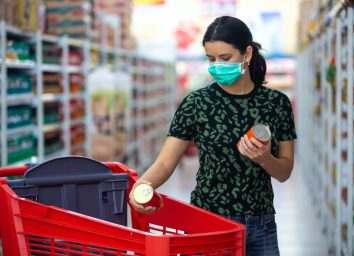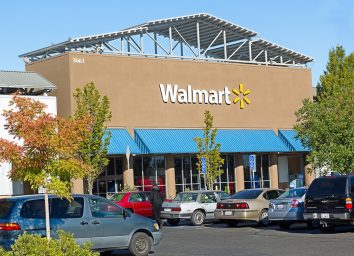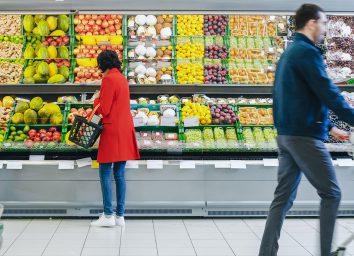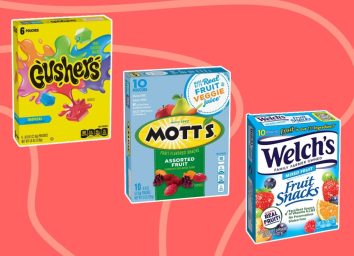33 Worst Mistakes You're Making at the Grocery Store
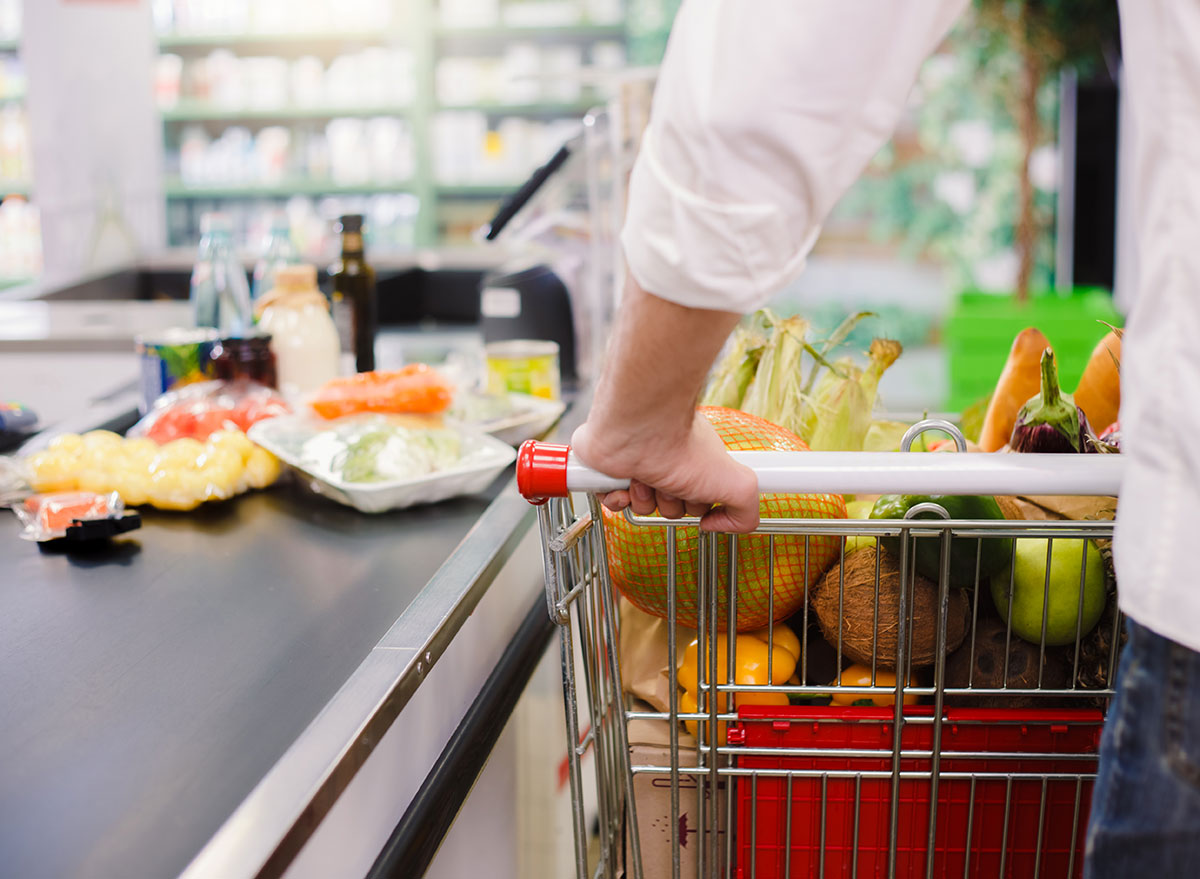
Grocery shopping in the midst of a pandemic is both necessary and risky. You need to eat, but you also want to minimize the amount of time you spend in a public, crowded, indoor space during the COVID-19 pandemic. From being cautious about what you're touching to where you are walking and how much time you're spending in the store, there are a number of mistakes you need to be wary of when food shopping during these times.
For both your health and that of the other customers, you should be careful to avoid these mistakes when in the grocery store.
Not wearing a mask
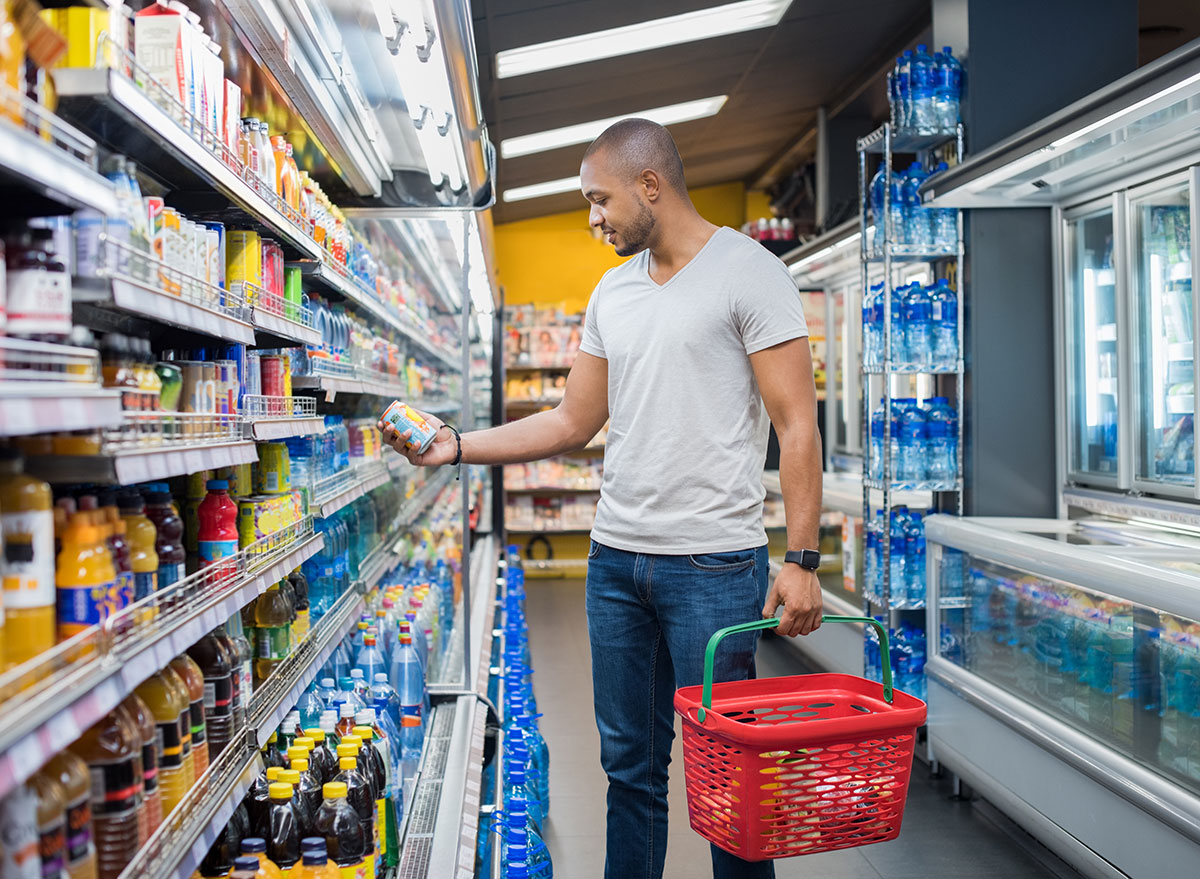
Failing to wear a mask (and correctly) is one of the biggest mistakes anyone can make these days when in an enclosed place such as a grocery store—particularly when COVID-19 cases continue to skyrocket in several parts of the country. But I'm keeping more than six feet away from everyone else, you might tell yourself. But recent research shows coronavirus can travel much farther than six feet—more specifically, the length of a room and beyond. It can also remain potentially viable in the air for as long as three hours. So, if you are not in the habit of putting a mask on before you enter the grocery store, now is the time to make it an every-visit practice. (Related: All of the Beloved Grocery Store Items That are Secretly Being Discontinued.)
Hanging out near the cash register

According to health experts and grocery store workers, the cash register is likely the most hazardous place in the supermarket. This is where you're likely to have your most extensive interactions with another person (likely, the cashier and other customers) during your whole trip. It's also where "every customer passes … and stands … for some time while groceries are moving down the counter," Brandon Brown, an epidemiologist at the University of California, Riverside, told CNN. For every minute you spend in this part of the store, you're increasing your potential exposure to COVID-19. (Related: Amazon's New "Dash Carts" Make Grocery Shopping a Breeze.)
Redeeming stacks of coupons
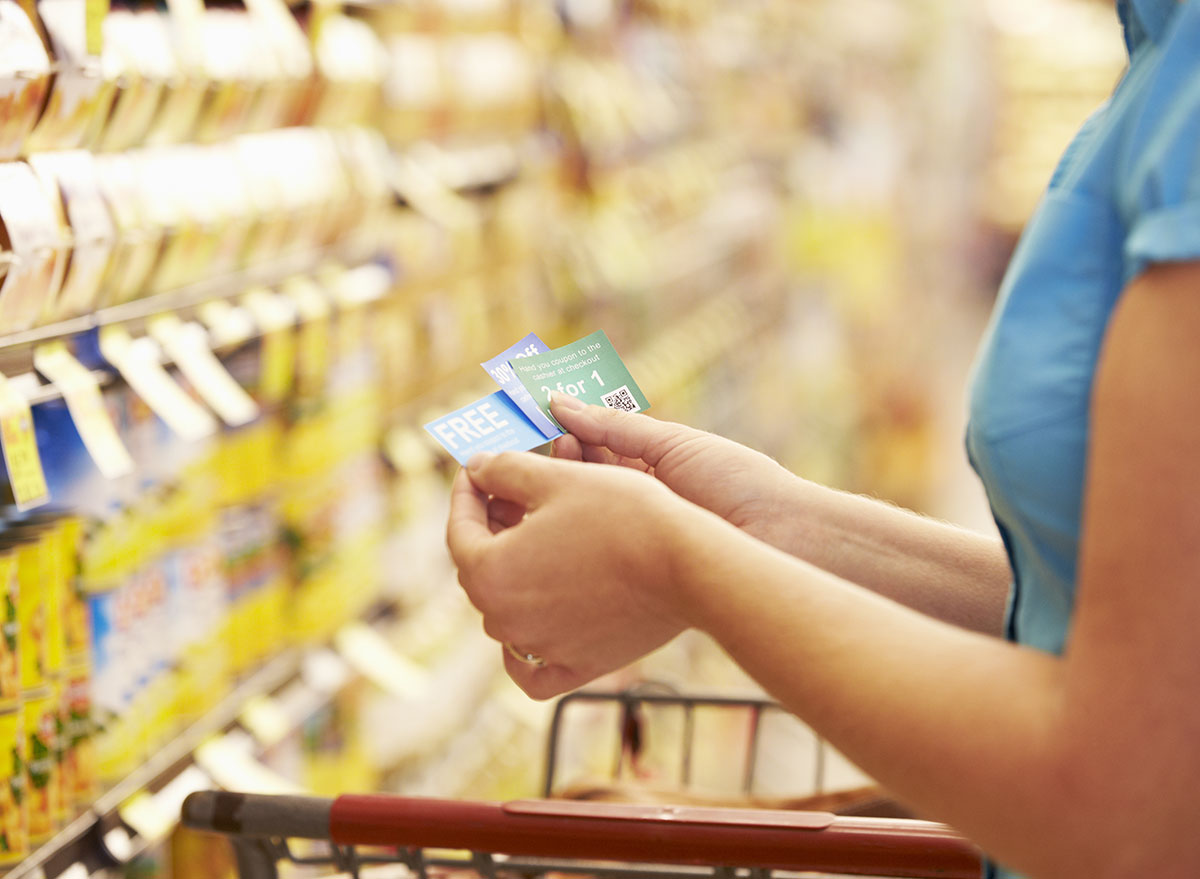
Unless you are on a tight budget or cannot afford groceries, the middle of a pandemic is not the smartest time to dig through your wallet or bag for that 49-cent coupon on cat food. While frugality is usually a good thing, if you roll into the store with a pile of coupons that require the cashier to spend more than five minutes scanning them to give you all your discounts, it could end up costing you a lot more than a few bucks. Again, the less time you spend at the cash register, the better, and coupon clipping is one of the biggest time wasters in the store. (Of course, if you need to, that's a different story…)
Ignoring the one-way arrows in the aisle
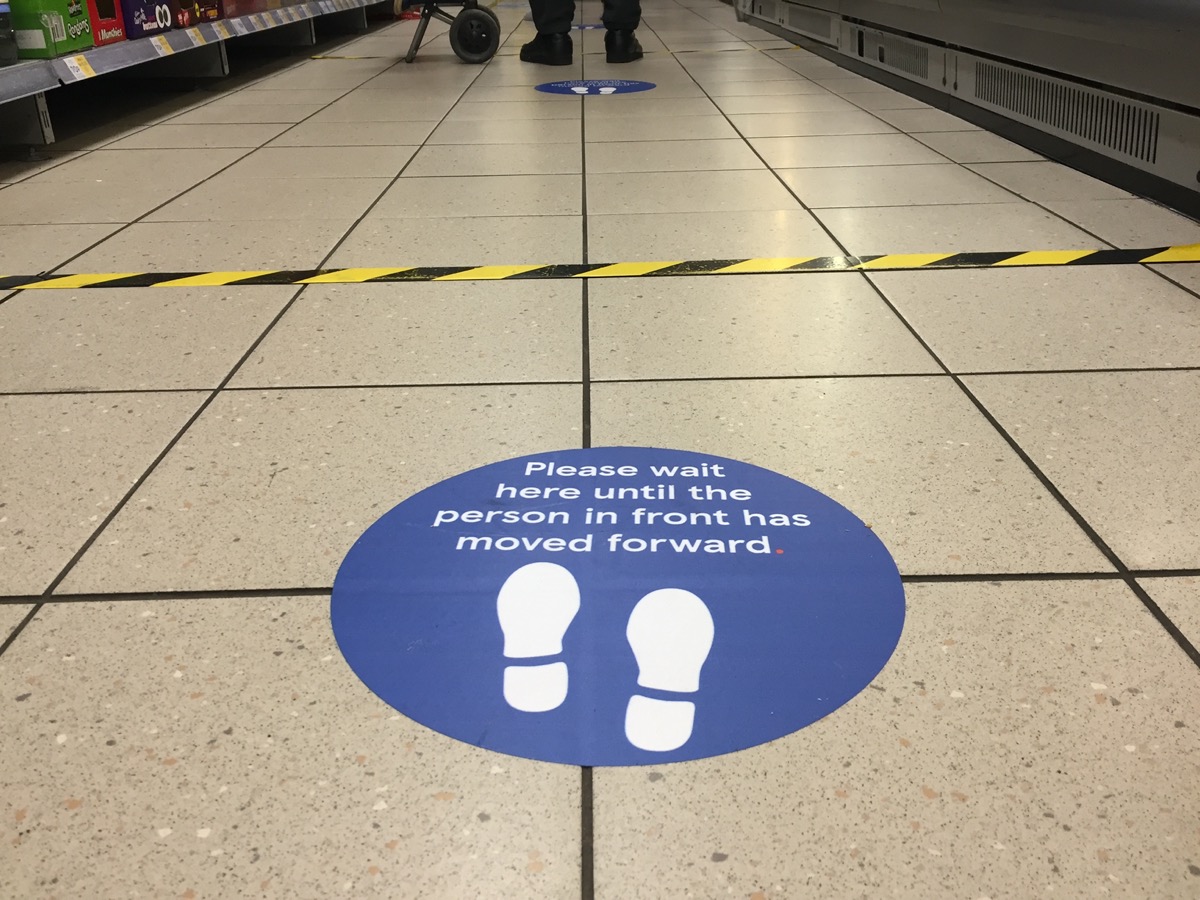
One of the more simple and effective ways that grocery stores are ensuring that customers are social distancing is changing their aisles to one-way, helping avoid situations where one person has to squeeze by another or cross into each others' space. Of course, it only works when you follow the rules.
"Ignoring those signs will increase the chances that you will pass too closely to the person next to you in the aisle, where staying six feet apart with two-way traffic is virtually impossible," Chad Sanborn, M.D., an infectious disease pediatrician at KIDZ Medical Services, tells Eat This Not That!. "The signs also serve as a reminder to not get too close to the person in front of you in the aisle. If everyone ignores the one-way signs, in theory, you could have two clouds of droplets drifting in different directions in an already small aisle, which is a problem." (Related: The Worst Mistakes I've Seen Walmart Shoppers Make.)
Forgetting to wipe down the cart handle
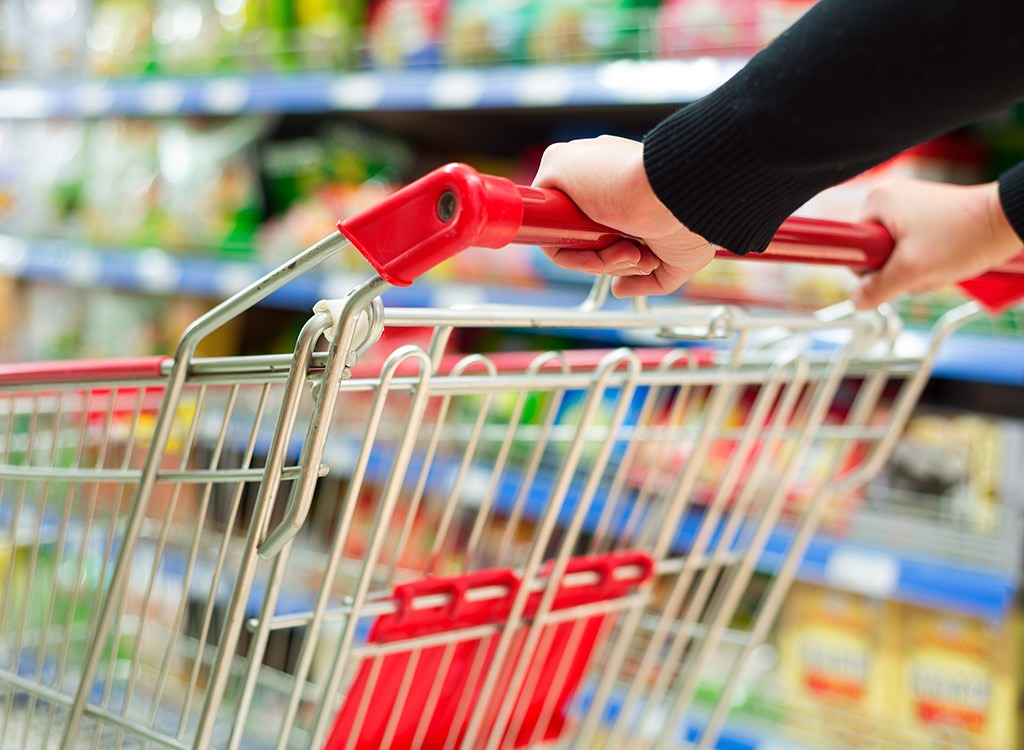
While many grocery stores have stepped up their sanitation practices, unless you actually see a grocery store worker disinfecting the shopping cart you are about to grab, it's anyone's guess how many people have touched it before you and left their potential traces of virus behind. A quick sweep with a Clorox Wipe or napkin with hand sanitizer ought to do the trick.
Grabbing a shopping basket instead of a cart
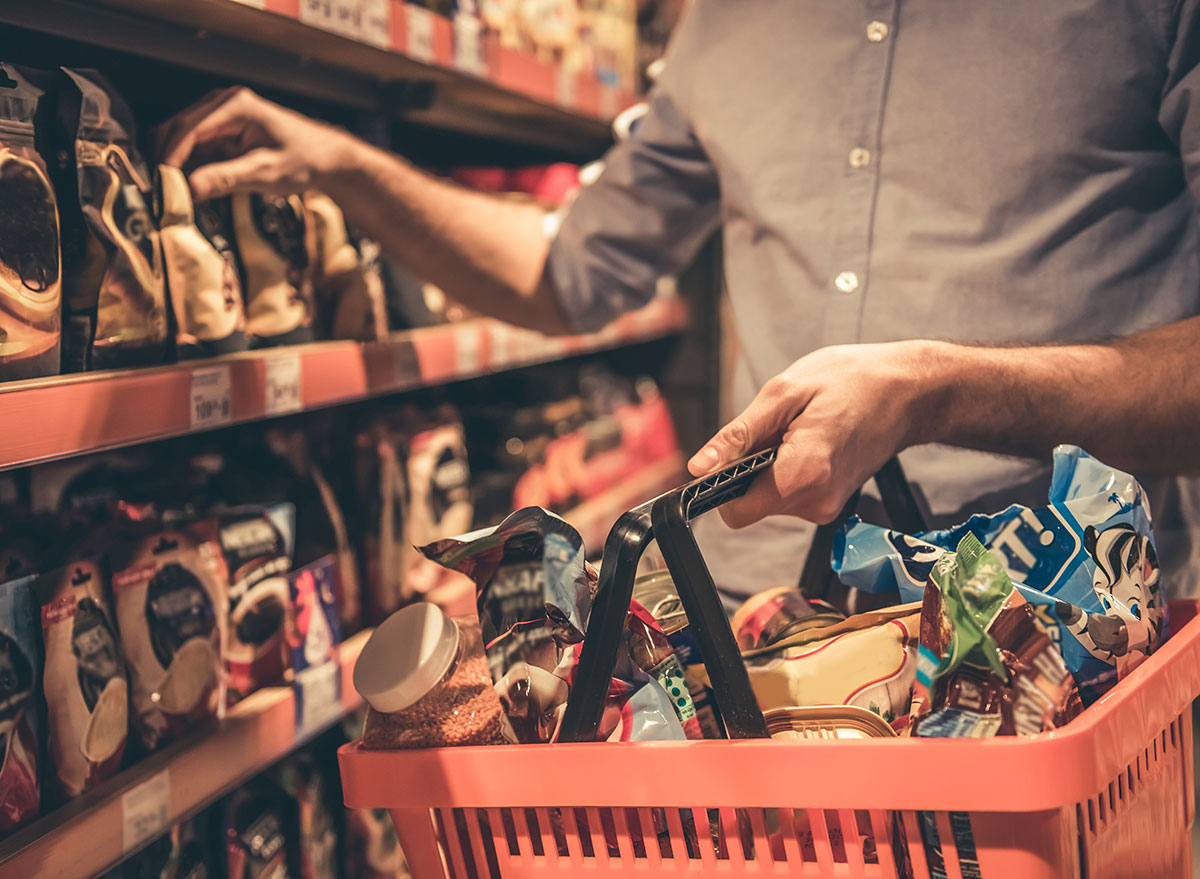
While you should be sure to clean the handle of your shopping cart, you might want to avoid the baskets altogether. Yes, you can also sanitize those handles, but "It's almost impossible to wipe off all the surfaces that people might touch," Leann Poston M.D., M.B.A., M.Ed, a consultant for Invigor Medical, told Eat This Not That!. "Baskets are stacked and then used. Even if the baskets were thoroughly cleaned, they might be contaminated when removed. Unlike shopping carts, it is tough to keep your shopping basket away from personal items and clothing."
Better just to go with the grocery holder that you can wheel around in front of you than one you have to keep holding at all times.
Touching the produce
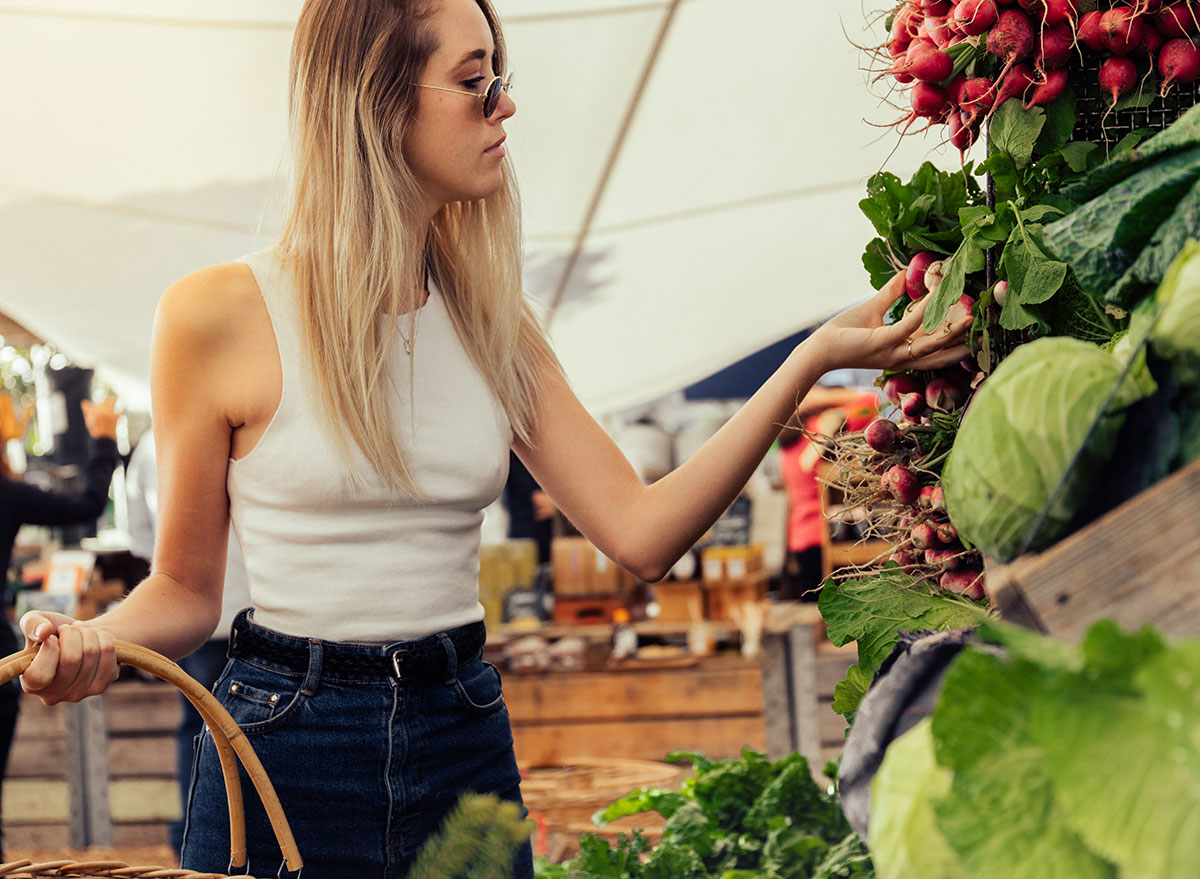
Of course you want to find the perfect melon for your fruit salad, but for the sake of everyone's health, you should keep your produce-handling to a minimum in these pandemic days. This area has some of the most-handled items in the store, with dozens of customers passing through and giving various fruits and vegetables a squeeze before putting them back. The odds that every one of those people is sanitizing their hands before picking up each item is highly unlikely. Bacteria can be left behind and transferred from one item to another.
Touching your phone
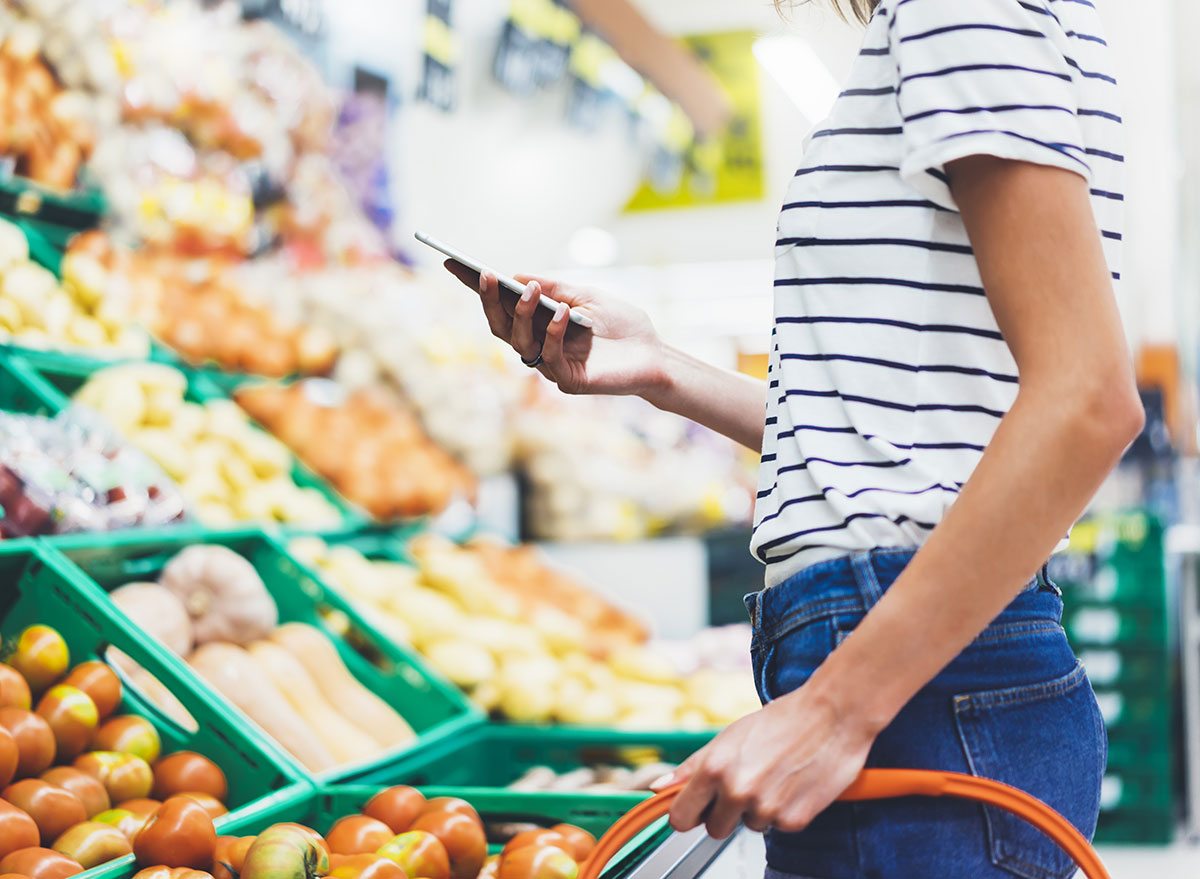
Even before the pandemic, smartphones were a cesspool of potentially dangerous bacteria. We touch our phones constantly, whether we've just washed our hands or not, and most forget to disinfect their devices regularly, making them what researchers at Bond University recently called "trojan horses for coronavirus." If you do have to pull out your phone to check a recipe or ask your partner what else you should pick up, be sure to disinfect it after your shopping trip.
Texting and surfing with your phone
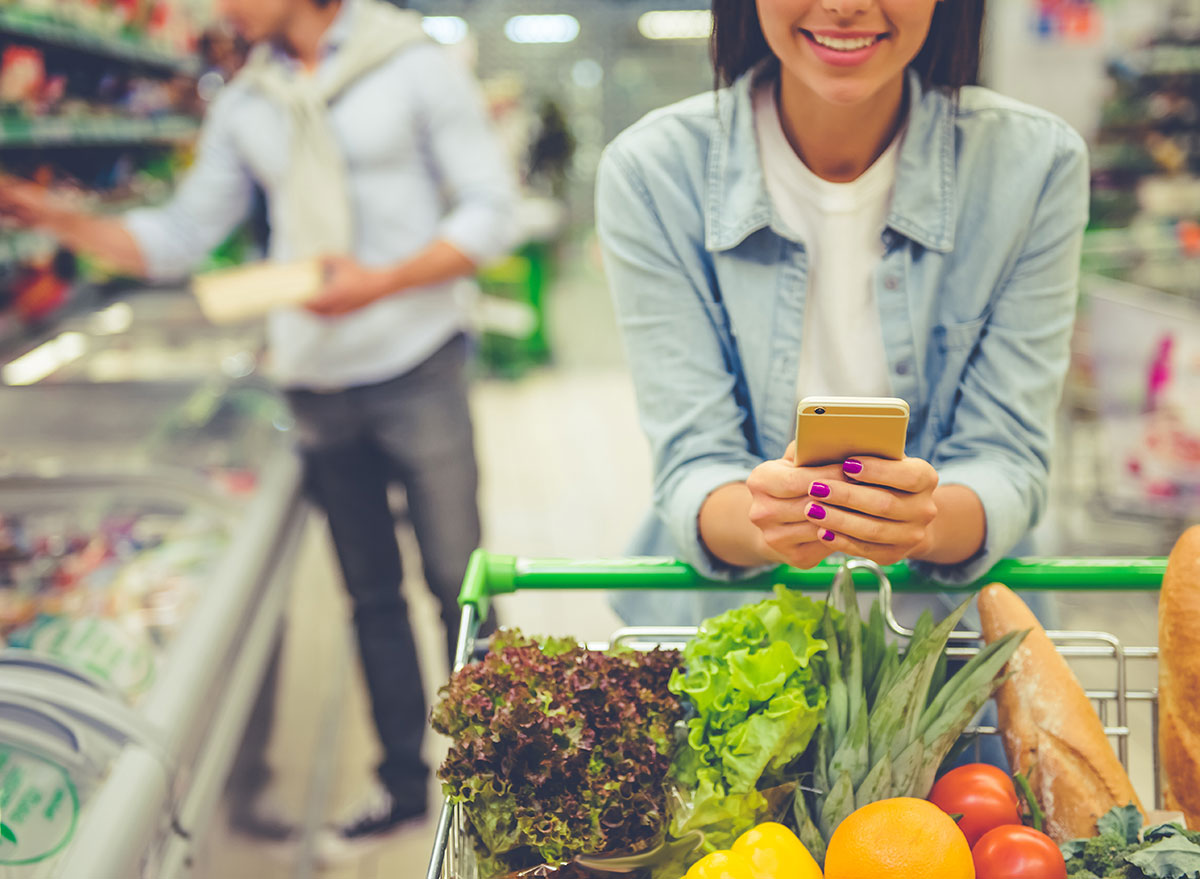
Not only is touching your phone while shopping a bad idea due to the bacteria it can spread, it can also be very distracting. Just as texting while driving pulls your eyes from the road and increases the potential of accidentally colliding with another car or causing another incident, keeping your eyes on your phone while moving through the grocery store creates the potential for you to forget to social distance from other shoppers, overlook the one-way aisle arrows, or make some other error that causes health risks for you and others.
Rocking out to your favorite music
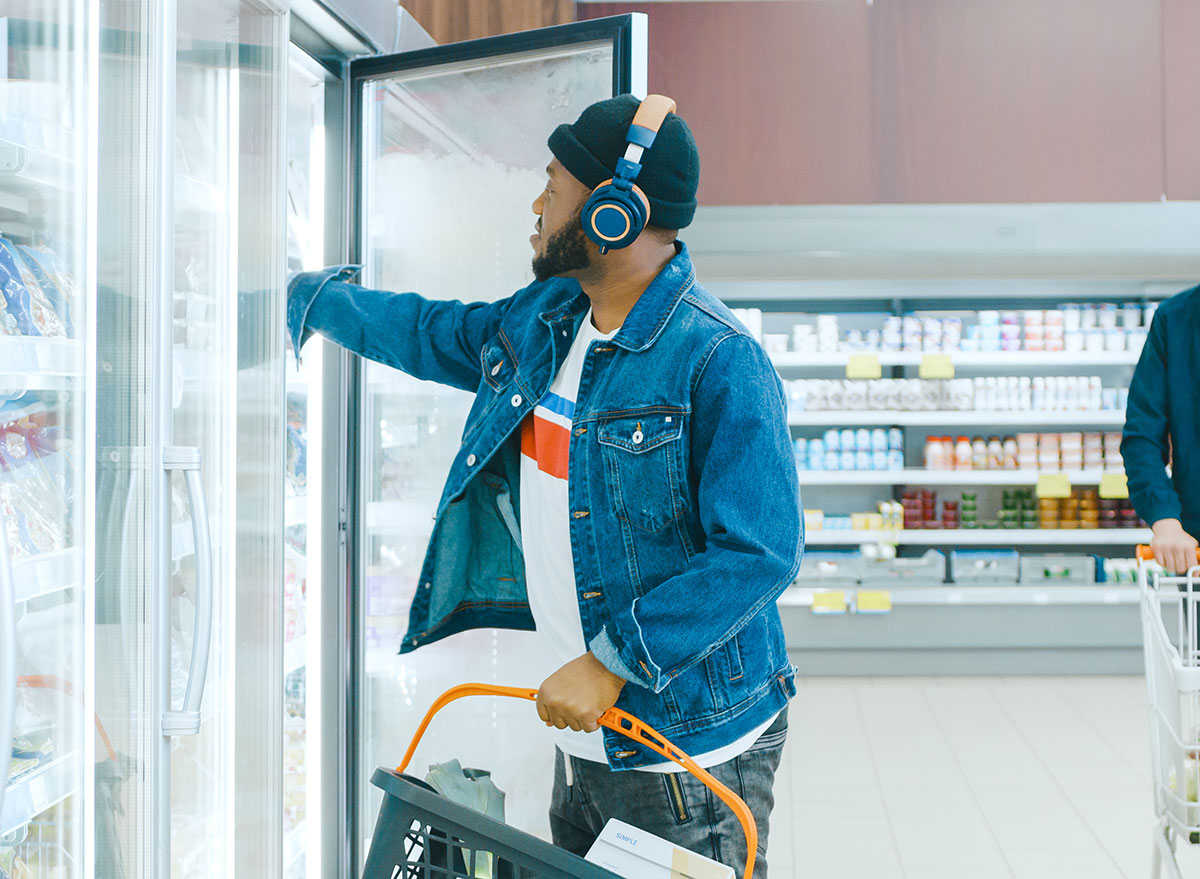
Grocery shopping amid COVID-19 requires that you pay full attention to what you're doing, and that includes being able to hear what others are saying around you and being able to sense when someone is approaching from behind. That can be difficult to manage when you've got your headphones in and your music cranked up.
"With the threat of COVID-19 and the need for social distancing, it's advisable to limit all distractions, including excessively loud music, for the safety of yourself and other shoppers," Daniel Rosen, M.D., a bariatric surgeon who runs covidtestingnyc.com and serves as a concierge COVID-19 medical adviser, recently told Eat This Not That!. (Of course, this does not apply to anyone who needs to wear hearing or listening devices of any kind for health reasons.)
Entering a store that doesn't have a health policy posted
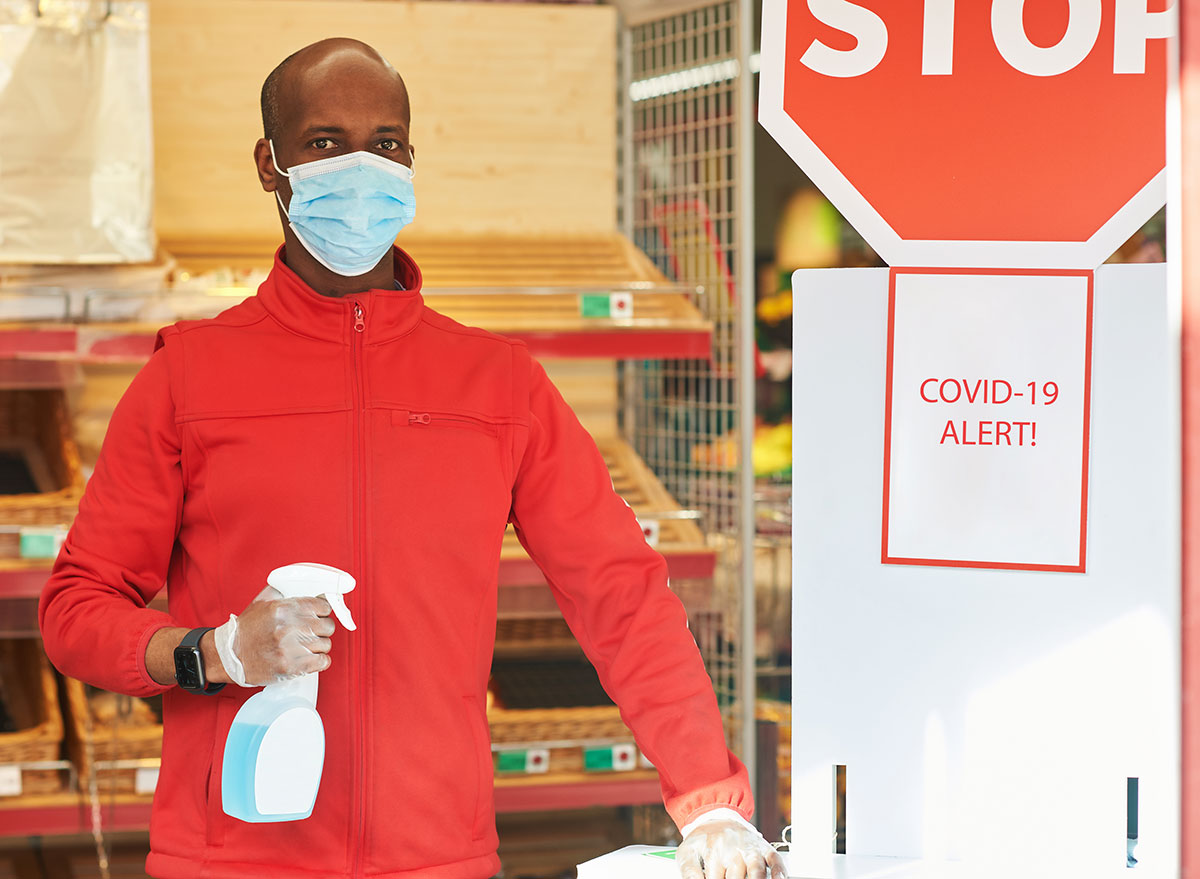
Sometimes, you can read a book by its cover. A store that has no clear signage at the front explaining its health policies ("social distancing and masks required," for example) may be a store that does not strongly enforce these rules, even if required by the state or city. If you don't see any indication at the store's front that it's following clear COVID-19 policies, you might just want to turn around and head to a different place.
Shopping somewhere where the ventilation is bad
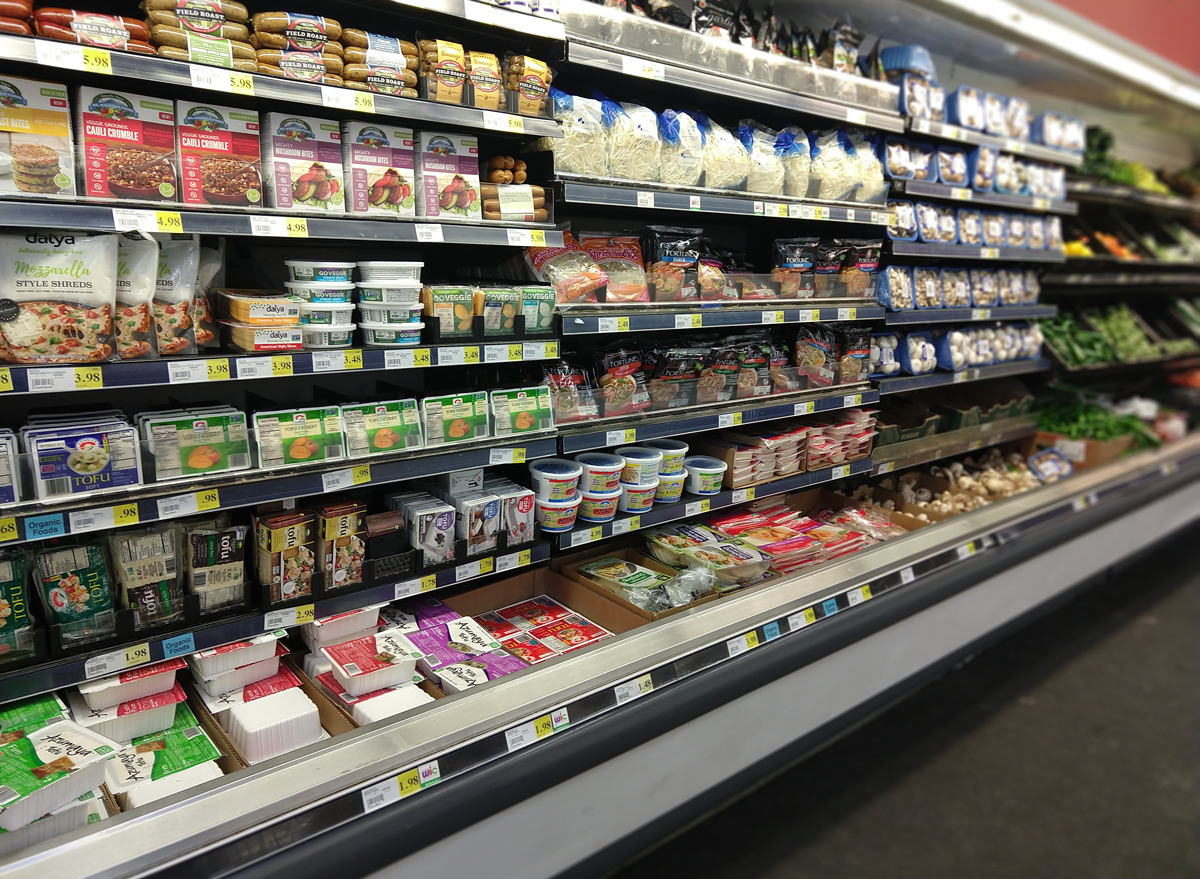
The World Health Organization has warned that the coronavirus can float in the air of enclosed spaces and be transferred from one person to another. This makes it that much more important that stores have good ventilation systems, and ideally, are keeping doors and/or windows open for plenty of air circulation. If the store feels muggy or does not seem to have good airflow, you may what to shop elsewhere.
Paying with cash
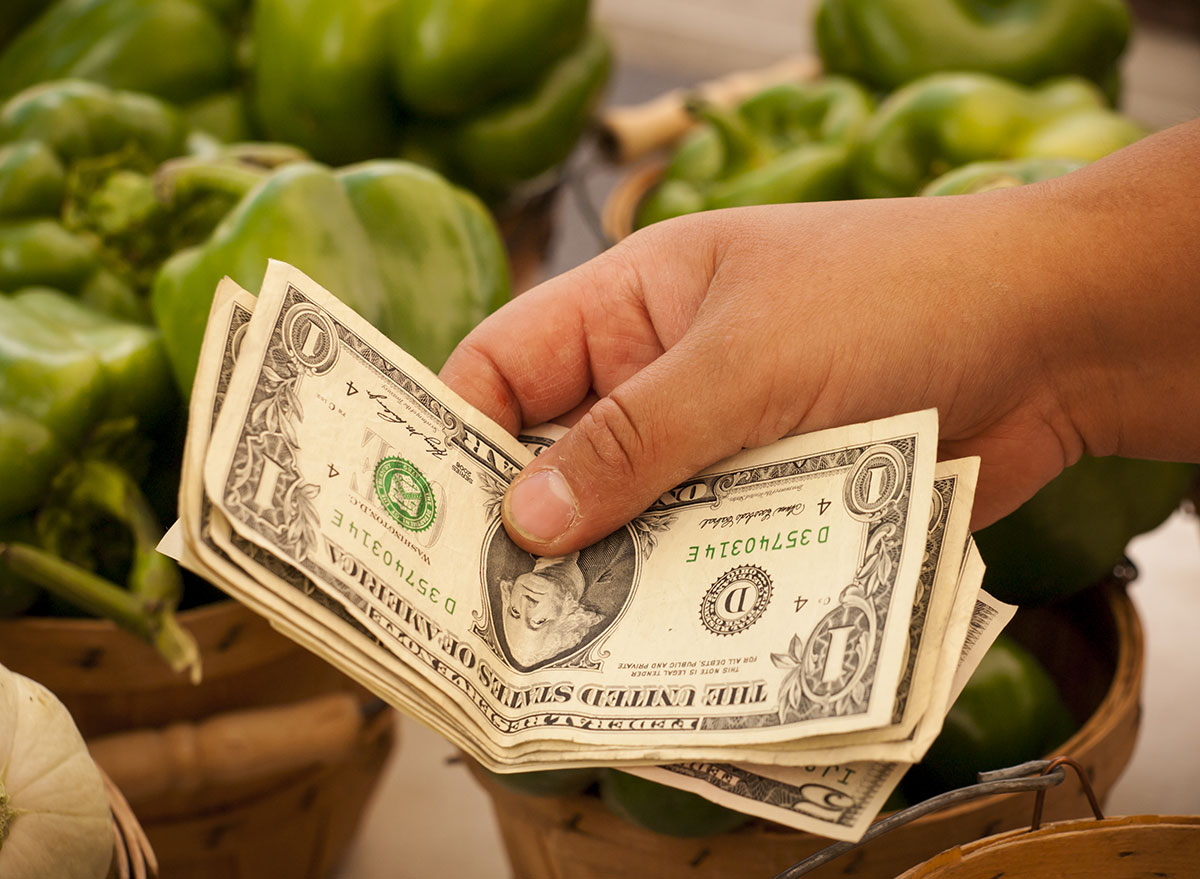
Cash carries loads of bacteria. One 2014 study published in Future Microbiology tested a variety of currencies from around the world, finding contamination on anywhere from 80 to 100 percent of the bills examined. It also involves getting change back, increasing your physical interactions with the cashier. Add to that how hard it is to clean (are you really going to sanitize every bill you get back as change?), and it just makes much more sense to use a credit card.
Touching the credit card pad
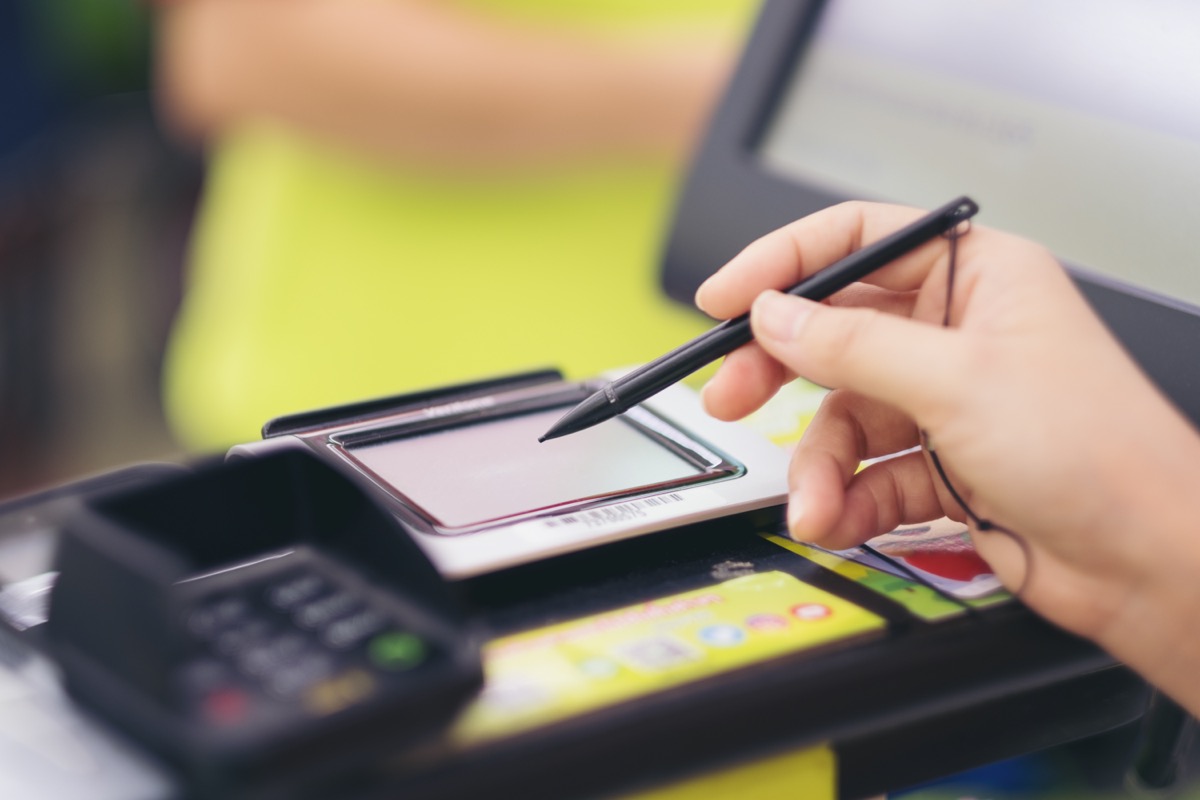
The touchpad of the credit card machine is perhaps the most-touched place in the grocery store, so you should touch it as little as possible. Ideally, use Apple Pay or touch-free payment if your credit card allows for it. If that's not an option, just be sure you are minimizing your contact with the bacteria-packed device. If you have to sign, consider holding the pen with a napkin or some kind of antibacterial barrier.
Forgetting your grocery list
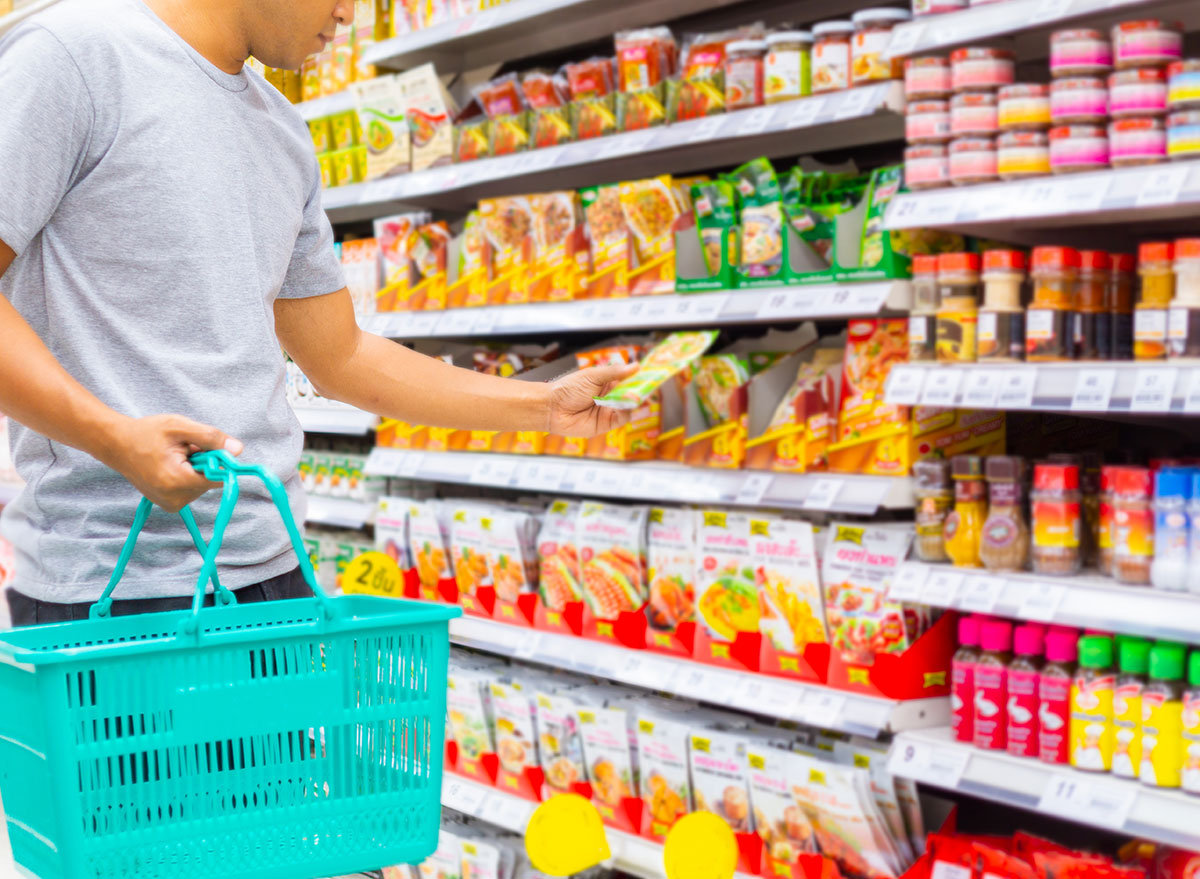
Grocery shopping in the COVID era should be done swiftly and purposefully—you should get in, get what you need, and get out, minimizing your time spent indoors. That means going with a clear list of what you need (and ideally, strategizing where in the store you will get each item so you can move quickly). That means coming equipped with a list of all the items you need so you aren't struggling to remember or figuring it out as you move through the aisles.
Using shopping outings as family entertainment
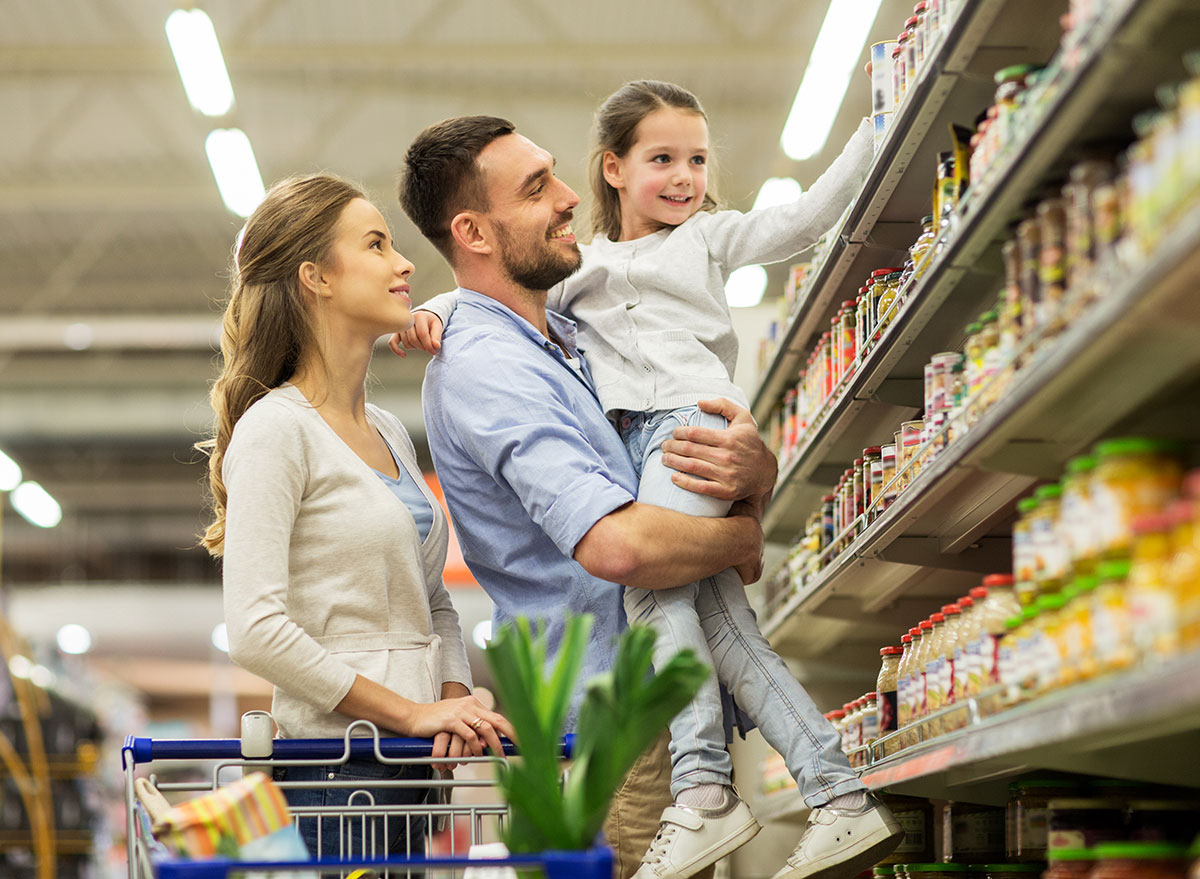
While shopping at a big-box store is not necessarily more dangerous than going to a local, smaller grocery store, it does present a variety of risks. As Jagdish Khubchandani, Ph.D., professor of health at Ball State University, told Eat This Not That!: "Unfortunately, big-box stores are becoming places for socializing and family outgoings—part of it could be shopping therapy with all the stress and isolation. The overcrowding of such places is deeply concerning, especially when people are disregarding social distancing and wearing masks."
He advises sticking with your local grocer, where you can get in and out and have fewer reasons to hang out and treat it as a place of entertainment, rather than just a spot for necessities.
Bringing kids with you

Actually, the best idea is to just not bring kids with you at all. Even the best-behaved kids might touch things they shouldn't or get closer to other shoppers than they should, putting you and your whole family at risk. If there's a way to avoid having your kids join you on your shopping trip, it's ideal to take advantage of that option.
Forgetting to social-distance at checkout
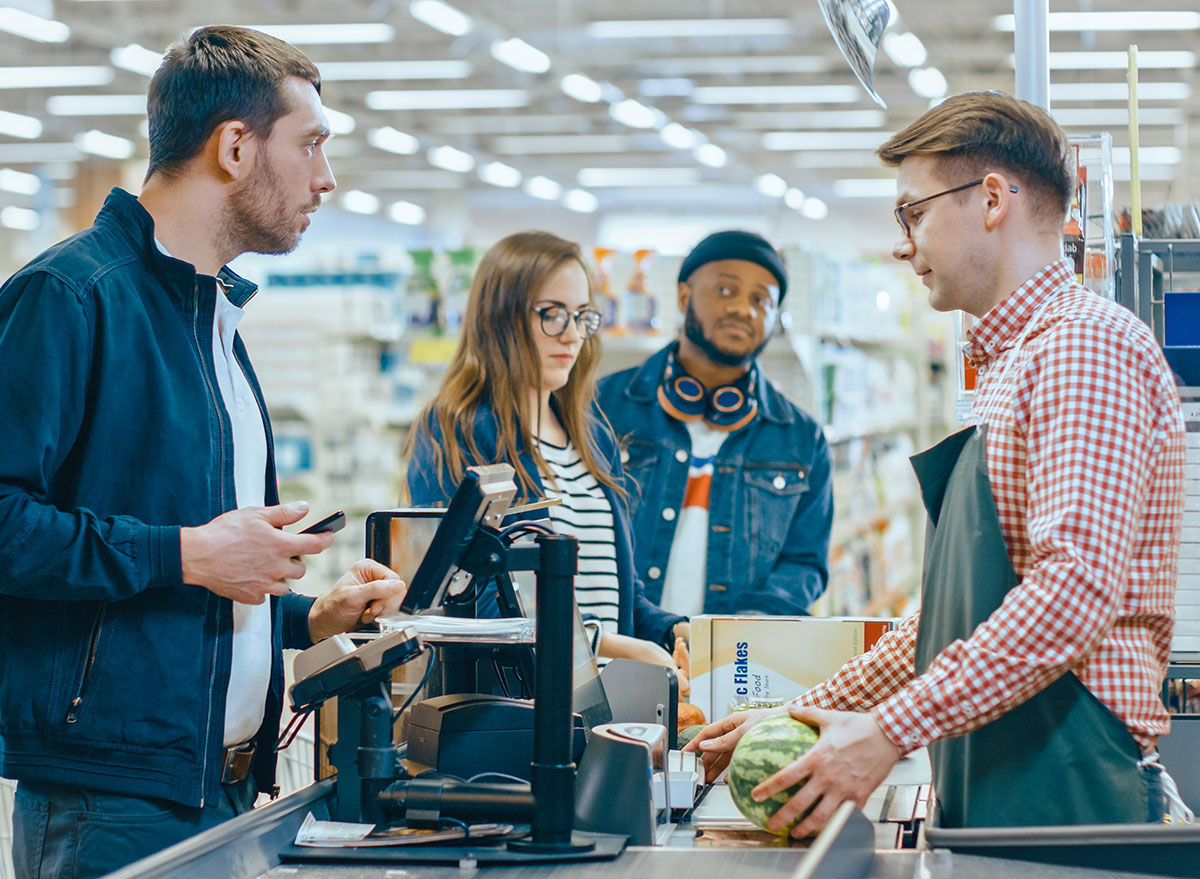
You should be maintaining six feet of distance from all other people in the store at all times. But, many shoppers can let this slide at checkout as lines start extending down the aisle and they get impatient to get closer to the front. Suddenly, the distance between shoppers starts to shrink and you may even find yourself in the middle of a crowd near the registers. This is one of the most dangerous situations you may find yourself in as a shopper, putting you near others who might be infected and close enough that droplets produced by their breathing or speaking could reach you.
Staying somewhere with a crowded checkout aisle
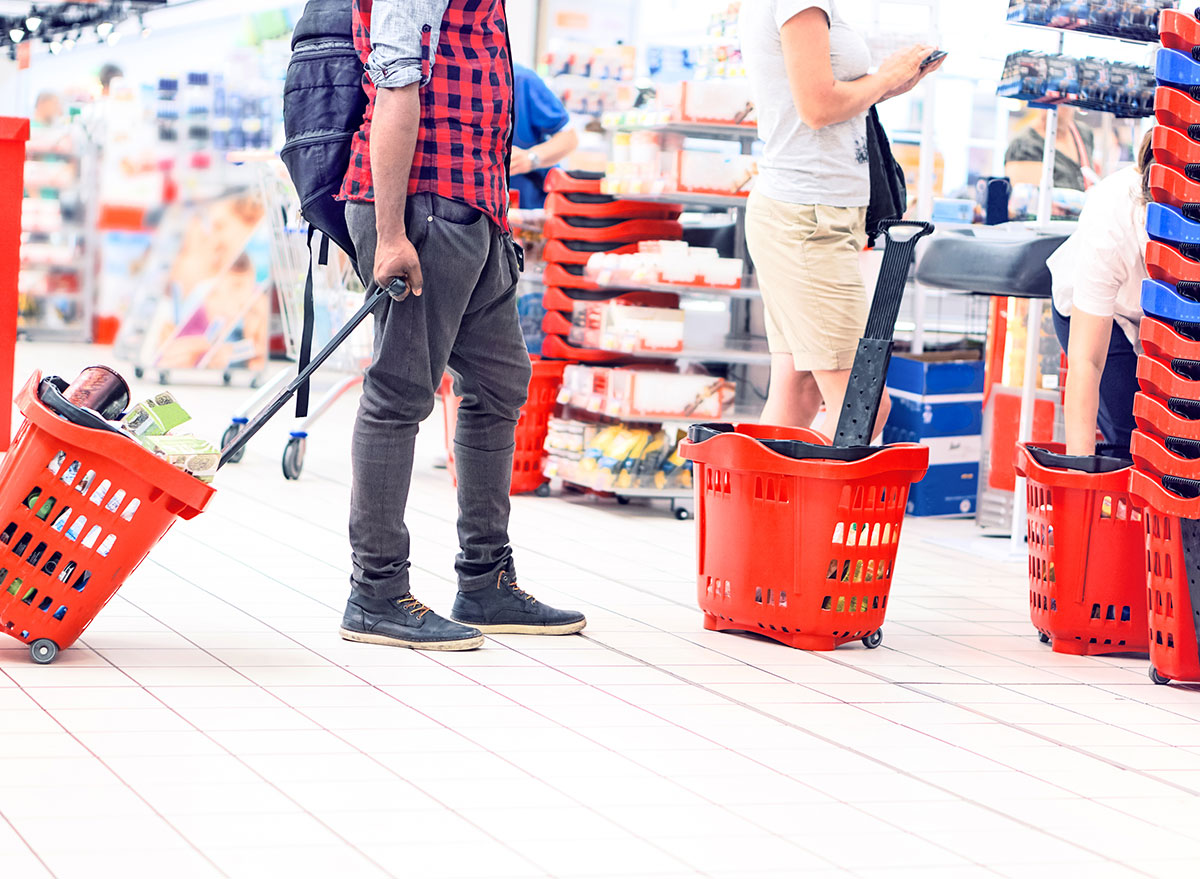
As you enter a store, you should take a look at the checkout area and make sure there are not a bunch of shoppers crammed near the aisles. Your best efforts to socially distance can be easily undermined if the store where you are shopping is not clearly telling shoppers how far apart to stand with floor markers, signs, or employees on-hand. If you see a crowd at checkout, you might consider going to a different store, or returning at a less busy time.
Going during peak hours
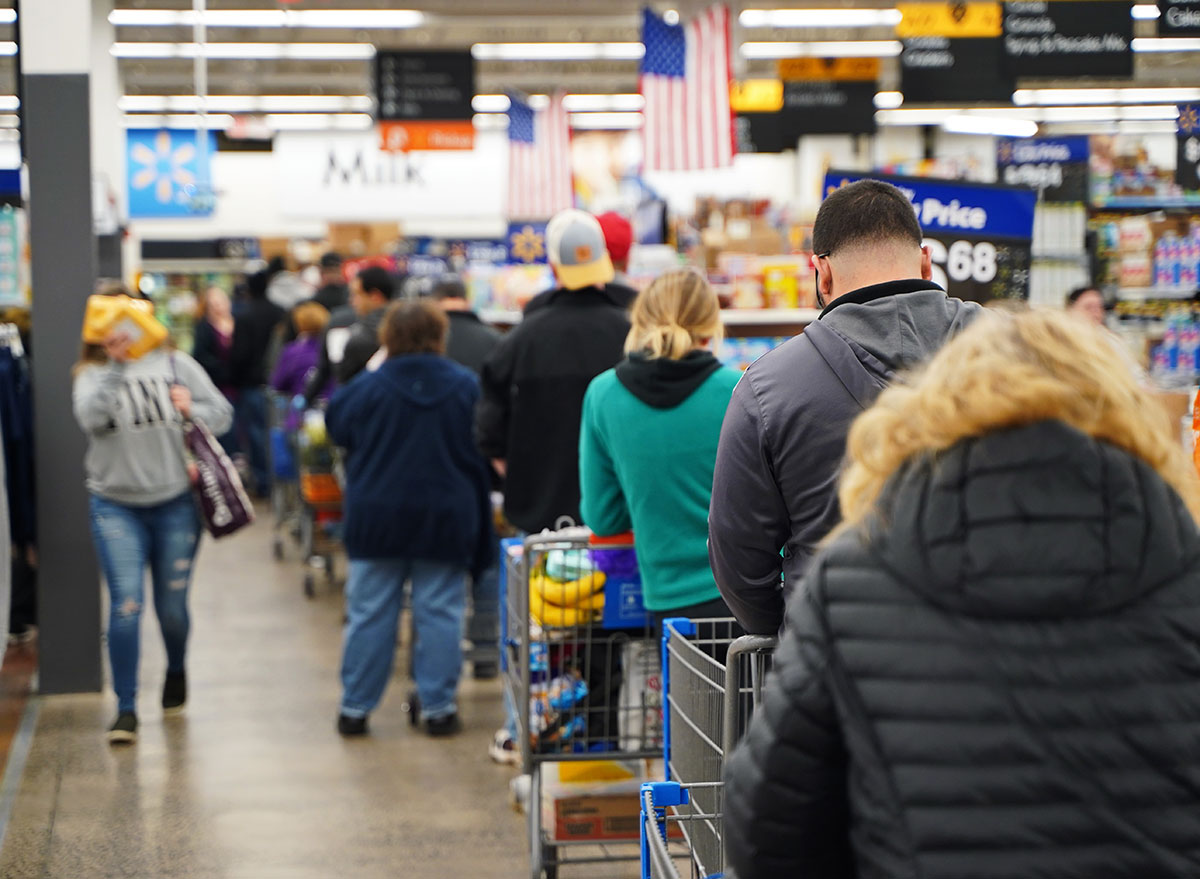
Any part of the store can be dangerous if you're there during a busy time. While many grocery stores have implemented a maximum-capacity policy, some of these are not enforced as well as they should be. And, if you go shopping during peak hours, you might find yourself struggling to keep enough distance from other shoppers, or ending up in a line that snakes throughout the store, keeping you in the enclosed place longer than you should.
Shopping at several stores in a row
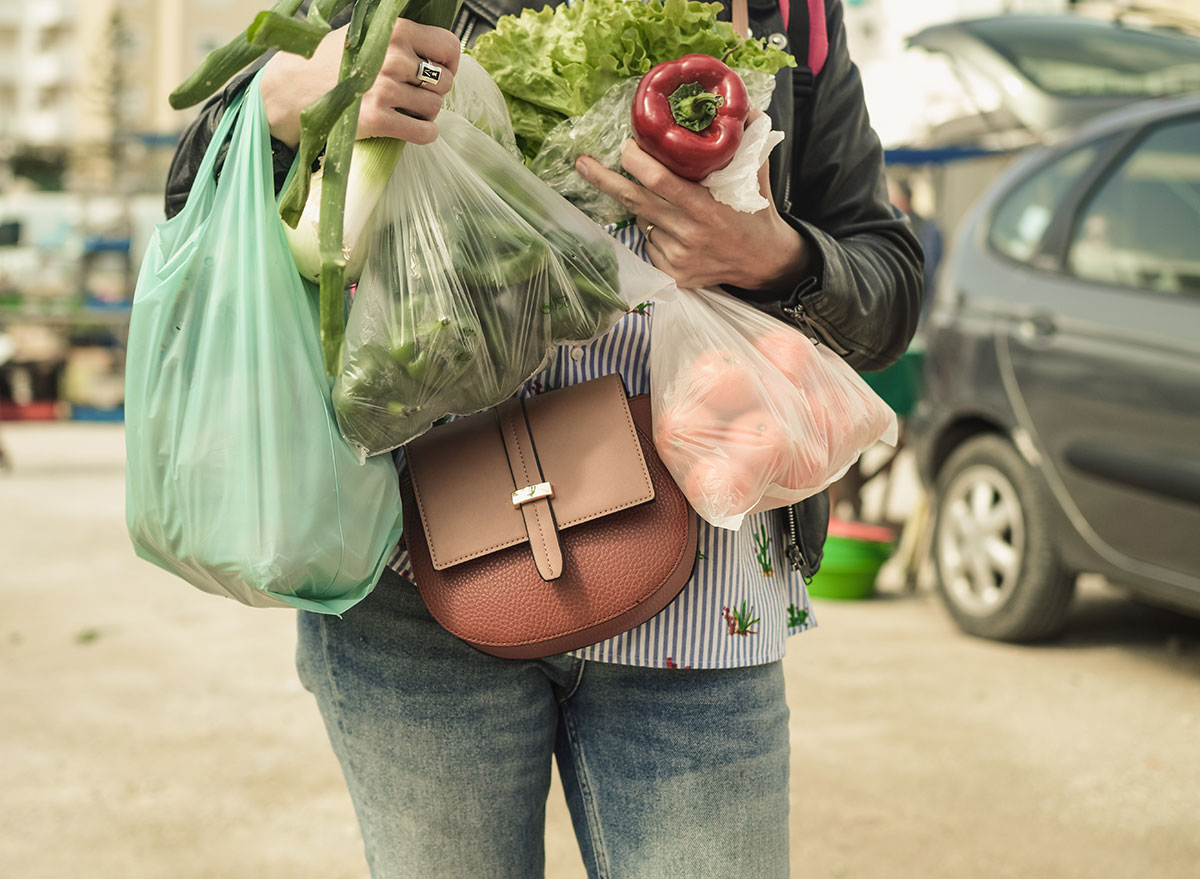
Every time you set foot in a store, you are exposing yourself to new risks. While you might have once had no problem tacking on extra stops during shopping outings to get that milk you like at one store and your favorite cheese at another, that kind of multi-stop trip can introduce growing risks. Instead, focus on one place and get in and out of there as fast as you can.
Buying too much at once

While it's important to minimize the number of shopping trips you make, that does not mean you should pack a month's worth of purchases into one outing. By overloading your cart and spending an excessive amount of time in the store, you are increasing the potential that you might become less focused on maintaining a safe distance from other shoppers. "Managing your groceries well can help you avoid any accidental exposure to COVID 19," Dr. Rashmi Byakodi, a health and wellness writer with Best for Nutrition, told Eat This Not That!.
Leaving your hand sanitizer at home

While many stores have hand sanitizer stations set up at the entrance and at the cash registers (ahem, you should probably avoid stores that don't have these), you shouldn't gamble your health on whether or not the store clerk remembered to refill the container. Bring your own mini bottle of Purell or antibacterial sanitizer in case you touch a surface that others may have touched before you (which is… basically any place in the store).
Touching your face
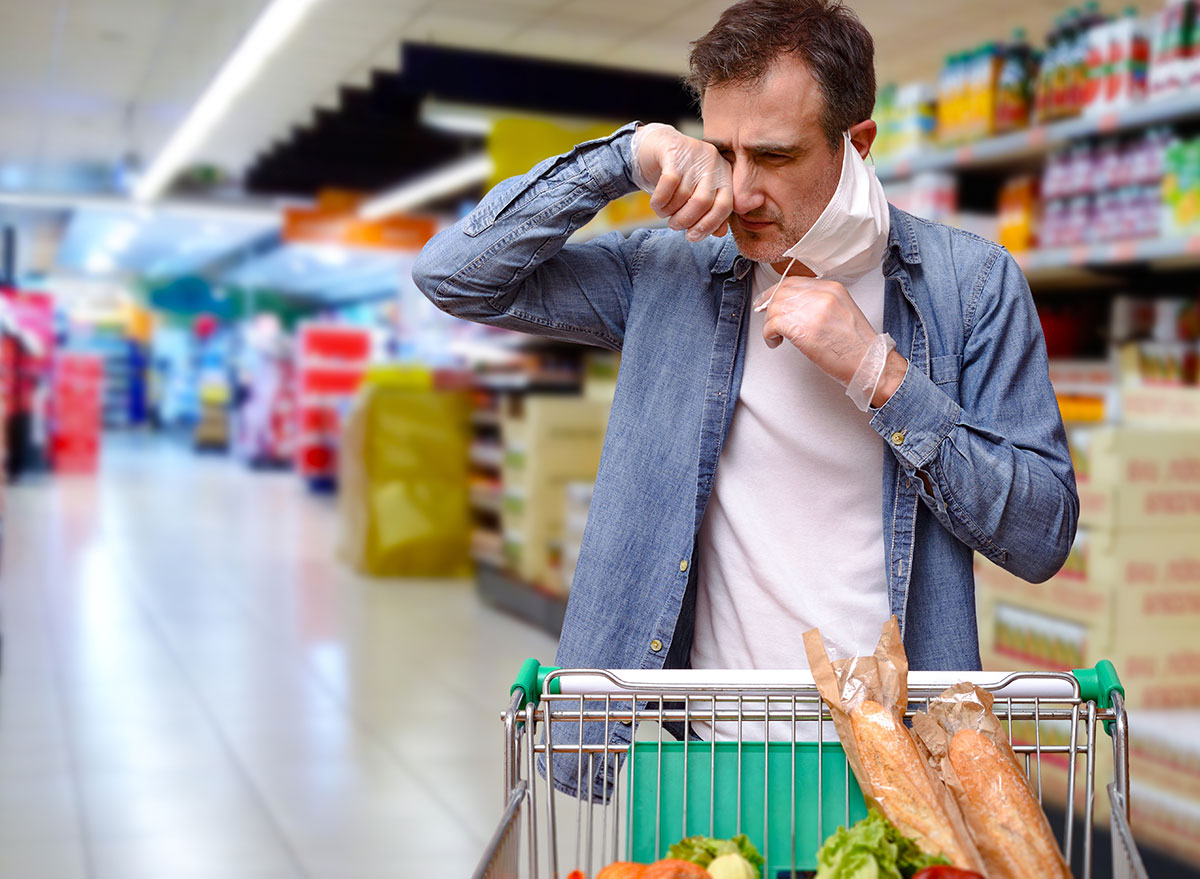
Since the coronavirus first caught on, health experts have warned against touching your face. "We touch a lot of things," Benjamin Singer, an attending physician at Northwestern Memorial Hospital and an assistant professor at Northwestern's Feinberg School of Medicine, told Vox back in March, "and the droplets that these viruses inhabit are possibly on the surfaces we touch—on our phones, our tablets, our remote controls. We touch those and then we touch our face, and that's the route of infection."
That is doubly dangerous in a public, enclosed place such as a grocery store, where hundreds of others have passed through, and where it's easy to pick up bacteria and not realize it. If your nose itches, use your sleeve to itch it rather than your fingers.
Holding your phone to your face

Data from the WHO finds that bacteria similar to coronavirus can live on surfaces such as phones for up to 96 hours. That's dangerous enough when you consider that you touch your phone dozens of times throughout the day. But, if you actually hold the phone to your face when making a call, it makes it that much easier for the virus to spread to your eyes, nose, or mouth. Talking on the phone this way during your grocery shopping trip also leaves you without a hand to navigate your cart and causes distractions that can result in you failing to social distance. Try your best to stay off your phone until you're out of the store.
Forgetting to sanitize after paying
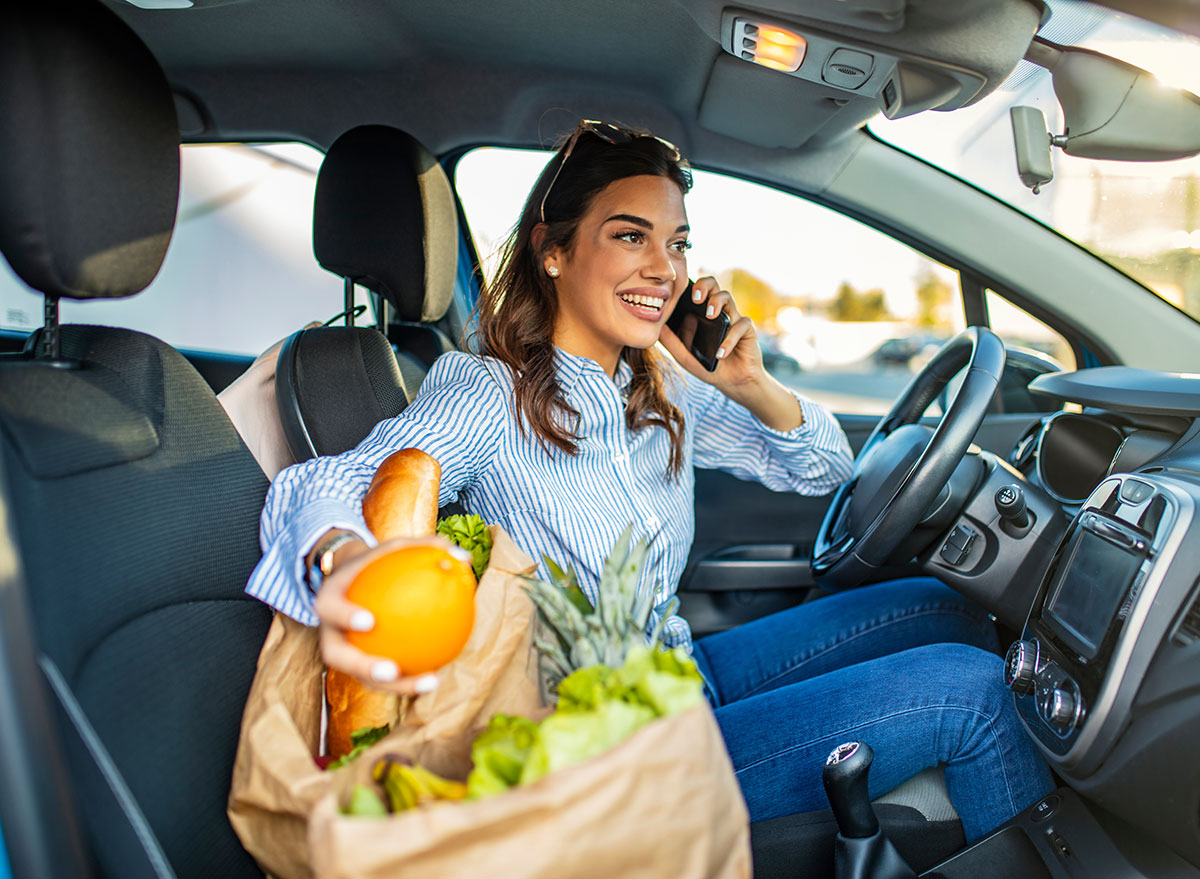
However much you touch the pad or pen at checkout, you should do a quick disinfection after you leave the cash register. Squirt some sanitizer onto your hands and use a wipe to clean your credit card before putting it back into your wallet, ensuring you killed any potential germs before touching anything else.
Bringing reusable bags into the store
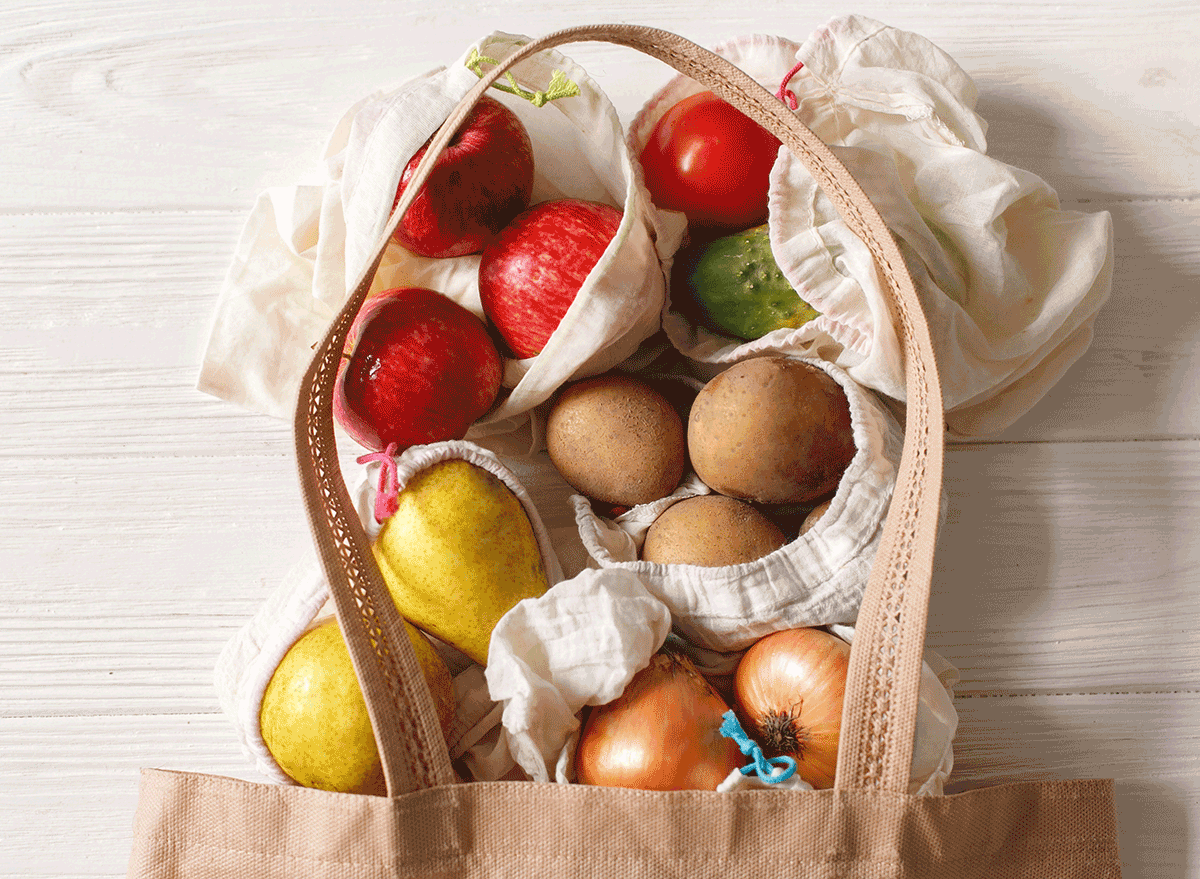
Yes, they're more environmentally friendly, but canvas tote bags or reusable bags can also be carriers of dangerous bacteria, according to several studies. You can mitigate this by regularly washing the tote bag you use to pick up groceries, but it might be easier (albeit controversial) to just stick with disposable bags until we're out of the worst of the pandemic. As Joseph Vinetz, a professor of infectious diseases at the Yale School of Medicine, told MPR News: "I think that using billions of plastic bags a year is a bad thing for our environment. But right now, it's even worse for our environment to have an ongoing pandemic."
Touching refrigerator door handles
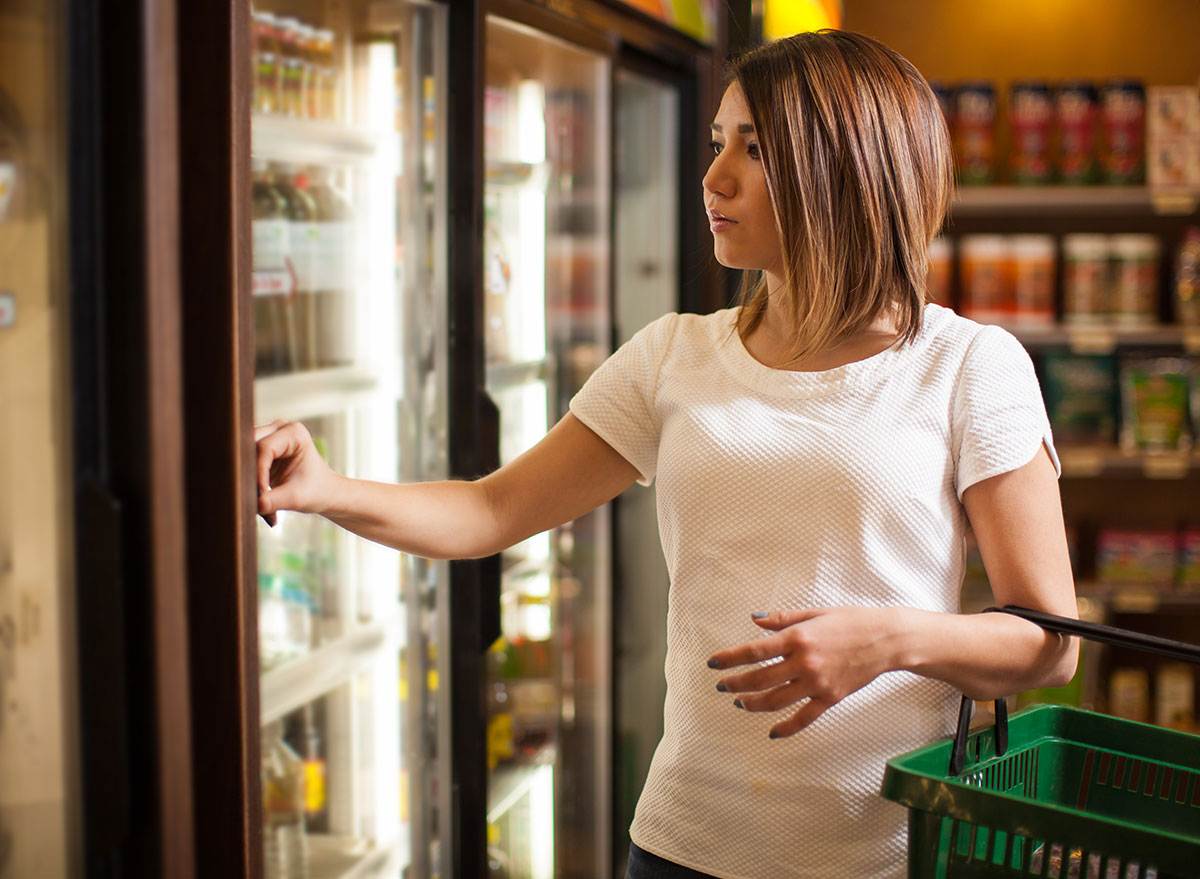
Among the most-touched spots in the grocery store are those handles to the refrigerator and freezer doors. Obviously, if you want to get something cold, you're going to have to figure out a way to open these, but you should proceed with caution: Use a napkin or your sleeve to open it, or at least sanitize your hands after touching the handle (and be sure you don't touch your face afterward).
Bringing sunglasses into the store

This might seem like a strange "mistake," but in fact, sunglasses can prove to be a health hazard during these pandemic times (unless, of course, you need them for medical reasons). "You wear your sunglasses on your head or clip them on your shirt and frequently touch or adjust them while shopping. It's an unnecessary risk for a 30-minute shopping venture," Gail Trauco R.N., BSN-OCN, patient advocate and CEO/founder of Medical Bill 911, told Eat This Not That!. Also, if you're wearing them, you increase the chance you'll be adjusting them, and putting your hands near your face—one of the most common ways the coronavirus is transmitted.
Visiting a store that doesn't require face masks

Just as you might want to think twice about entering a store that doesn't have clear social-distancing policies posted, you also might not want to spend too much time in an enclosed place that doesn't explicitly require all customers to wear masks. While this can occasionally lead to some awkward exchanges by those who don't want to follow the rules, for the most part, it's a sign that the store takes its customers' health seriously, and that those who shop there will be less likely to spread the virus between each other.
Wearing gloves
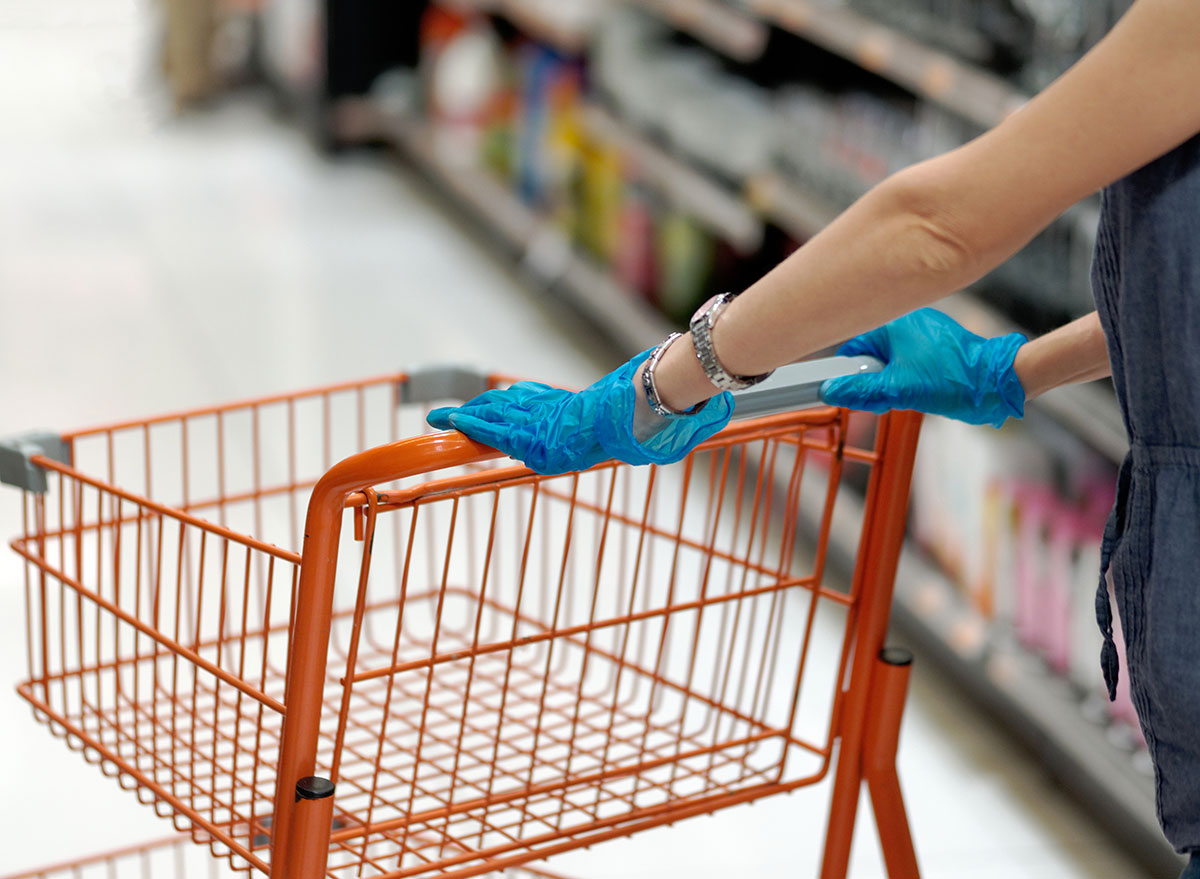
This might seem like a strange thing to avoid—after all, gloves are meant to protect you, right?—but these safety accessories can actually cause more harm than good if used incorrectly. Part of the danger is that those who wear gloves might not put them on or remove them properly. Part of the danger is the false sense of security gloves tends to give those who are using them.
"Gloves act like your second skin, and you may feel safe to touch anything in the grocery shop," Byakodi told Eat This, Not That!. "When you are touching various items with gloves, you may spread the infection to whatever thing you touch next; this may also include your face, phone, purse, or another item at the grocery store."
Studying nutrition labels
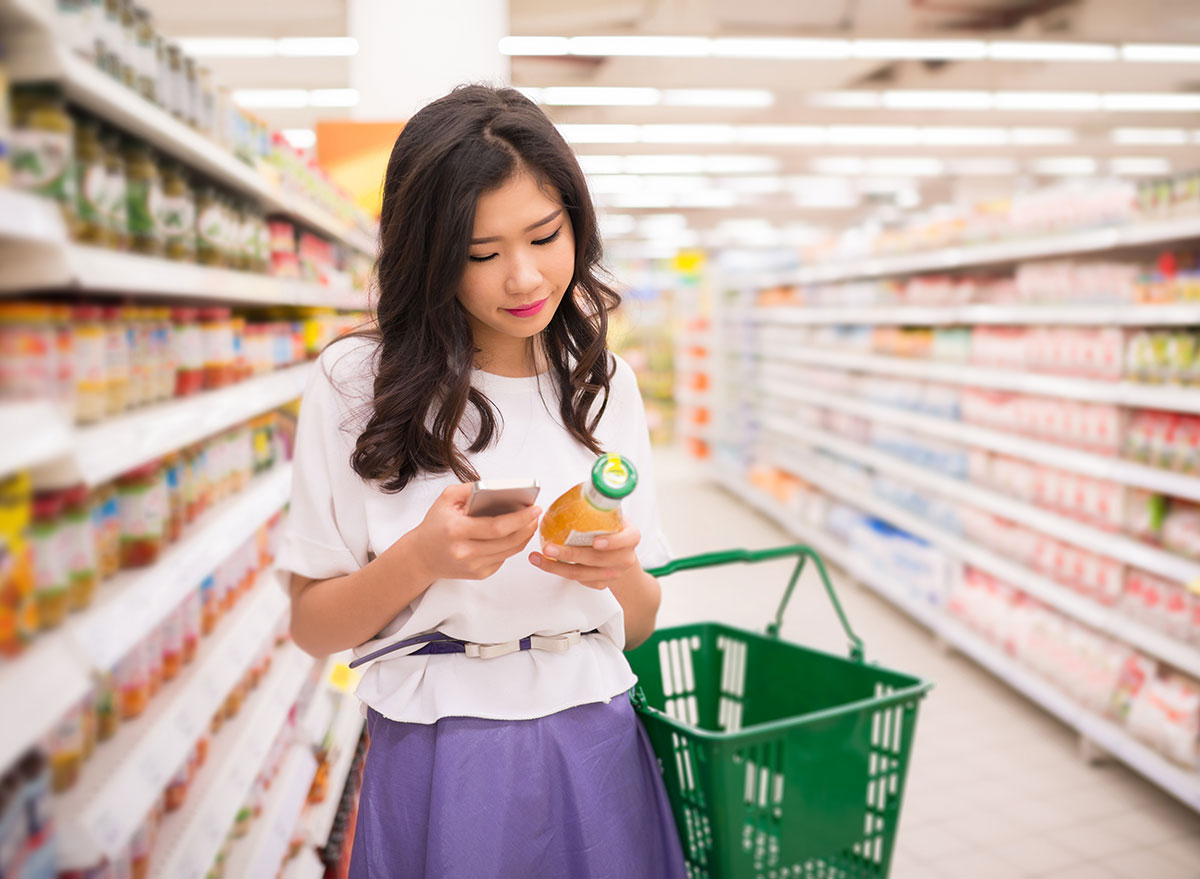
You want to eat healthy—we all do. But, when we're in the middle of a pandemic, it's not the best time to spend hours milling around the grocery store scrutinizing nutrition labels. While it's commendable that you know what you're buying and putting into your body, spending longer than absolutely necessary in the store is not a great idea for your own health. Plus, standing in grocery store aisles exposes others to increasing health risks. It's a much better move right now to do your research before you head to the store and make a detailed list of what you need.
Being too chatty with the cashier or store worker
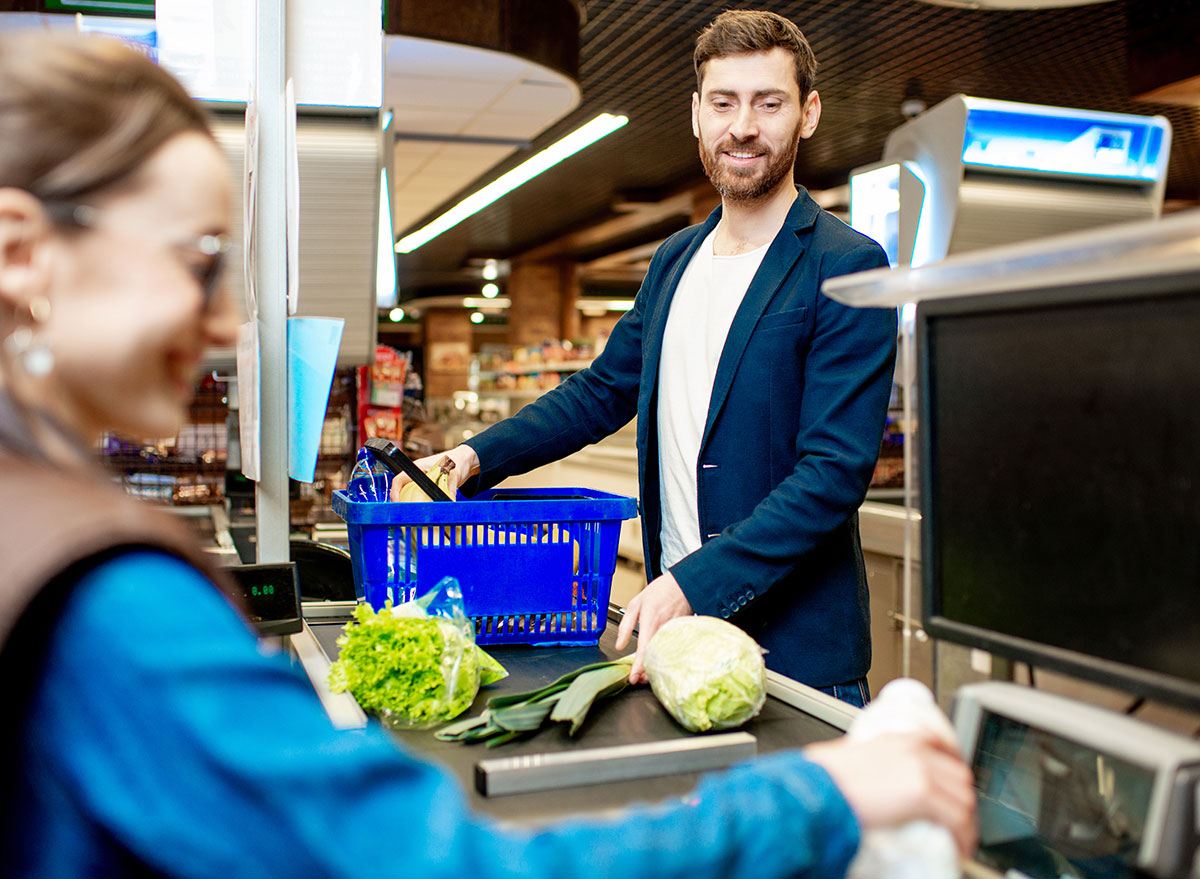
You can be friendly to those who work at the store, as well other shoppers, but that doesn't mean you should be engaging in long chats with them. Close talking can expose you to potential bacteria, and if you're taking up the cashier's time with conversation, it's causing everyone else in line to spend longer in an enclosed space than is probably wise. You can still be polite, but now is not the time for chattiness.
For more, make sure to sign up for our newsletter to keep yourself informed.
